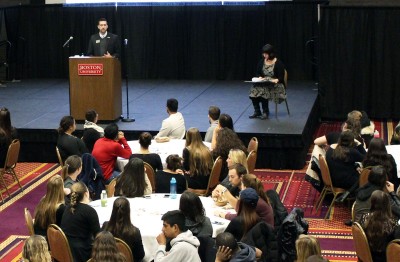
Members of the Sigma Delta Tau sorority and Zeta Beta Tau fraternity at Boston University as well as Northeastern University students in the Boston City Area chapter of ZBT, gathered Tuesday night at Metcalf Hall in the George Sherman Union to host a program called “Safe Smart Dating with SDT and ZBT,” addressing unhealthy and abusive relationships.
Over 200 people attended the program, which was sponsored by Jewish Women International.
Participants had the chance to talk about the different kinds of abusive relationships and how to deal with them, regardless of whether the student is in the relationship or not, said Laurence Bolotin, the executive director at the national ZBT national organization.
“The program creates an interesting dynamic because it brings both men and women together in the same room to talk about the topic of healthy relationships, which is something that they’re learning about on campuses and they’re hearing about, but it’s oftentimes not bringing both genders together,” he said.
Dana Fleitman, the senior manager of prevention and training programs at JWI, and Bolotin guided the program through lectures and a presentation with various small-group activities.
Groups of students were given printouts of stories of abusive relationships and hypothetical scenarios, and they were given questions about the nature of these relationships to facilitate conversation about the topic.
Bolotin said students should do something about unhealthy or abusive relationships if they witness anything. Communication without fear is an overall goal, he said.
“Thinking that someone else will do something about it or saying, ‘It’s not happening to me,’ or ‘I don’t know that person,’ that’s an excuse that just has to end because while it may not be them that day, it may be them the next day and it’s just really important they have the courage and they are able to address it head on,” he said.
A poll prior to the program found that 16 percent of SDT members and 26 percent of ZBT members said sexual assault tends to be exaggerated, which was displayed on the presentation screen several times throughout the night with other relevant statistics.
The program also made use of live infographics fueled by anonymous texting from the audience. The surveys asked questions such as, “What does a healthy relationship look like?” or “Have you experienced any type of dating abuse?”
Renee Wool, head of philanthropy for SDT’s BU chapter, said she was happy to see participation from many students.
“It was a great turnout with representation from various groups on campus and now so many students from the BU and Northeastern community know about unhealthy relationships and how to seek help or reach out to their own friends to hopefully create a better social environment,” said Wool, a sophomore in the College of General Studies.
Several students in attendance said they found the program informative and a good way to address the issue of unhealthy and abusive relationships.
“It’s good to create a culture where people are comfortable talking about different issues and not just sweep it under the table like people tend to,” said Spencer Showalter, a sophomore in the College of Arts and Sciences.
Sean Dacey, a sophomore at Northeastern and a member of the Boston City Area chapter made up of Northeastern students, said he thought the program was educational and a good topic for college students to discuss.
“I actually learned a lot … It’s a national topic that has been getting more and more attention, as of late because of various scandals on campuses, and it is important for people our age, and men especially, to understand the seriousness of it more,” he said. “People joke about it a bit, and it’s sad because it affects a lot of people.”
Ali Shapiro, a junior in the College of Communication and president of BU’s SDT chapter, said the conversation was the first of its kind held by the chapter.
“I just hope that people walk out of the program feeling enlightened and feeling like they learned some incredibly valuable information that they can use in their everyday lives,” she said. “Not just for themselves, but for their friends and family and loved ones.”
Correction: An earlier version of this story referred to the Boston City Area chapter of ZBT as Northeastern’s ZBT chapter. While the chapter’s membership is made up of only Northeastern students, it is not officially recognized by the university. The article has been edited to reflect this change.




















































































































